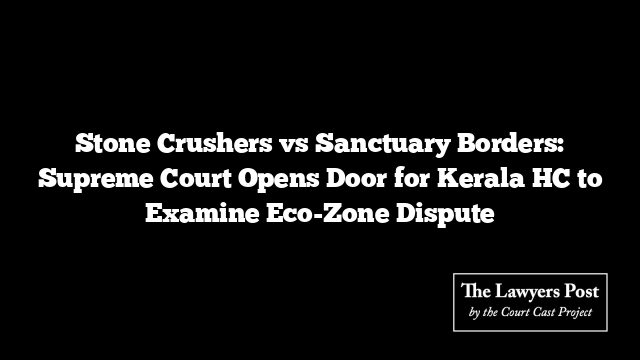The Supreme Court has thrown open the gates for a legal reckoning in Kerala over whether stone crusher units can function near environmentally protected zones. With a nod to judicial restraint, the apex court allowed a petitioner to pull back from its appeal and instead pursue the matter before the Kerala High Court.
The case revolved around Alankar Granites, a crusher unit operator in Kerala, who had approached the Supreme Court challenging a High Court order that had lifted a stay on stop-work memos issued against its operations. The memos were rooted in environmental concerns tied to the unit’s proximity to the Choolannur Peafowl Sanctuary.
A bench led by Justices KV Viswanathan and NK Singh, while entertaining initial arguments, eventually permitted the petitioner’s senior counsel to withdraw the plea, with liberty to press all contentions—including the assertion that stone crushing isn’t a banned activity under eco-sensitive zone (ESZ) norms and that the unit lies beyond the restricted boundary.
The order, quoting counsel, clarified that the crushers were situated 1.6 km outside the ESZ, and notably, there was no finalized notification marking the area as a wildlife sanctuary yet. The legal team argued that while mining is clearly off-limits in such zones, the unit merely crushes stones brought in from elsewhere—a technical distinction they believe exempts them from the ban.
An amicus curiae, involved owing to the larger environmental jurisprudence in the TN Godavarman Thirumalpad line of forest protection cases, was also present to assist the court.
The controversy has been winding its way through the courts for some time. In 2023, a single judge of the High Court dismissed the crusher unit’s plea against the stop memos, citing earlier Supreme Court directives that any prohibited activity under ESZ notifications must be strictly barred. A division bench later offered temporary relief by staying the memos—but that relief was revoked in May 2025, with the court noting that the sanctuary was in the process of being officially declared a wildlife sanctuary.
The legal battle is now poised to return to the Kerala High Court, where the fine line between environmental preservation and industrial operation in eco-sensitive terrain will once again be tested.





